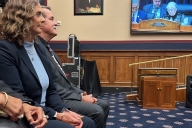You have /5 articles left.
Sign up for a free account or log in.
When a 16-year-old girl reported having been raped by two men at a Johns Hopkins University fraternity party last week, the university moved quickly to punish the chapter. Neither the victim nor the men are believed to be affiliated with Sigma Alpha Epsilon or the university, but Johns Hopkins said the incident was related to underage drinking at the off-campus house, and placed the chapter on interim suspension.
“We are in discussions about additional steps we can and must take in light of last weekend’s reported incident in order to protect the safety and well-being of our students and our visitors,” Kevin Shollenberger, the university’s vice provost for student affairs, said in an email to Johns Hopkins students.
On Friday, the university announced that open parties at fraternities are banned until at least the end of the semester. It’s a measure that some Johns Hopkins students worry could dramatically alter the university’s social scene, but collective punishment of Greek systems has been used with some frequency at other colleges this academic year, as well.
Earlier this year, the Massachusetts Institute of Technology banned all fraternity gatherings larger than 49 people after a woman fell from a window at an MIT fraternity. In September, Clemson University suspended all fraternity activity after several incidents this year, including a sophomore falling from a bridge to his death. Last month, all social activities within Emory University’s Greek system were suspended following an alleged assault at a fraternity there. The ban will remain in effect, the Emory Interfraternity Council said, until there are “tangible and proactive steps mending the flaws” within the system’s social scene. In most of the cases, the spark for stronger punishment was an incident that took place at one or two houses.
“I think it’s really clear why schools are starting to get more aggressive here,” said Elizabeth Armstrong, associate professor of sociology at the University of Michigan. “With colleges concerned about Title IX compliance and getting messages from the Department of Education that these kinds of issues related to sexual assault and harassment need to be dealt with, the climate is changing. And colleges are responding to these changes.”
While the majority of fraternity members do not commit rape, they are three times as likely to commit rape as non-members, according to a 2007 study published in the NASPA Journal. Fraternity members are also more likely to engage in binge drinking, as well as to have unplanned sex or be injured while drinking. Armstrong said colleges likely do not mean for these bans to be seen as specifically condemning fraternity parties, but are rather an attempt to address the negative effects of large college parties in general.
“Not all schools that have large party cultures have large Greek systems, but schools that have large Greek systems often have large party cultures,” she said. “And a lot of sexual assaults that happen in and around campuses are associated with these kinds of party environments. So it makes sense that if a college wants to go after that environment, going after fraternities might be a fairly efficient way of getting at the problem.”
At the same time, Armstrong said, systemwide bans could just push more parties to take place off-campus and create an adversarial relationship between students and administrators. It’s also not clear that banning any sort of party-related behavior is a successful deterrent for fraternities. A 2006 study published in the Journal of Primary Prevention found that even having a chapter officially go alcohol-free rarely reduces drinking and in some cases may even lead to increased alcohol-use.
Pete Smithhisler, president and CEO of the North-American Interfraternity Conference, said colleges should punish students who violate campus rules, but that systemwide bans are unfair and “undermine the spirit of collaboration and education that is supposed to occur on campus.” That’s an opinion also held by Thomas Fox, the national executive director of the Psi Upsilon fraternity, who said that systemwide bans are “rather new” to him and that they could punish chapters that have not done anything wrong.
“I think many times it isn’t meant to be a punishment, but if it is meant to be punitive, then it’s not fair,” Fox said. “I think it is usually a reaction where the administrators just don’t know what to do and feel pressure to do something big.”
If problems are so persistent that a systemwide ban must take place, he said, self-policing through a college’s interfraternity council is often a better route to take.
The bans at both Emory and Johns Hopkins were imposed by interfraternity councils, though Johns Hopkins officials later told students that the administration had directed the council not to hold social functions "pending completion of an interim plan to make parties safer." A flyer circulating around Johns Hopkins' campus calls the policy "unjust" and argues that fraternity parties and binge drinking are important tools for combating mental health issues related to "academic stress."
While some students are also upset by the party ban at Emory, the editorial board of the Emory Wheel, the student newspaper, commended the council’s decision and the fact that the ban came from within the Greek system.
“While ultimately, a ban imposed by the Emory administration may have had the same effect, it is an important symbolic gesture that the call to action came from IFC, an organization led by students in fraternities,” the board wrote in an editorial last week, though it also called for increased sexual assault education and training programs for members of the Greek system. "We recognize that many students, both inside and outside of the Greek community, may still see this as a war against the lifestyle that they have cultivated, but this view impedes progress towards addressing the issue. Instead, members of fraternities should hold themselves and one another accountable for what happens in their houses and take action to prevent sexual assault."
Interfranternity councils, rather than college administrators, have also recently been responsible for banning other behaviors among Greek students on their campuses. Last year, Pennsylvania State University’s Interfraternity Council banned parties during a key college party weekend known as State Patty’s Day. In September, Dartmouth College’s Interfraternity Council banned pledging at its fraternities and sororities.
“The motivation for these councils can vary,” Armstrong said. “They may be worried about lawsuits and it’s just a way to protect themselves. Or it may just be symbolic. But sometimes it’s that students realize that they are hosting these big events they can’t really always control. It could be pretty scary being a young person in one of these organizations and realizing that.”






![First text message: "Yes?" Second message: "This is embarrassing to say, but law school isn't fair for us men, the women are always outperforming us at [sic]. It's obvious women are taking over the legal profession nowadays." Third text: "Who is this?"](/sites/default/files/styles/image_192_x_128/public/2024-09/Text_messages_law_2.jpg?itok=0QWP419B)

